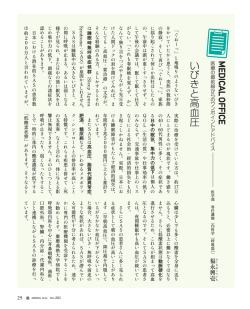
Sleep and rest facilitate implicit memory in a visual search task
医療情報システム研究室 NIRS グループ環境班 【文献調査】 Sleep and rest facilitate implicit memory in a visual search task 大西 夏子 廣安 知之 山本 詩子 2014 年 06 月 02 日 1 タイトル 睡眠と休息は視覚探索課題において潜在記憶を促進 2 著者 S.C. Mednick,T. Makovski,D.J. Cai,Y.V. Jiang 3 出典 Vision research,No.49,pp.2557-22565,April 7,2009 4 アブストラクト 学習形態は睡眠の改善になることが実証されている.げっ歯類モデルによると,睡眠中の海馬の中で覚醒時の出 来事の再生が人間の記憶統合の基礎となることが示唆されている.しかしながら,記憶に関連する人間の海馬内の 睡眠の役割の行動データは矛盾していた.睡眠が記憶時の海馬内における果たす役割をさらに調査するため,睡眠 とディスプレイに表示された視覚探索課題を繰り返しおこなった.視覚探索課題では,セッション 1,2 を交互に行 い,課題の影響の検討を行った.昼寝をしたグループと夜間に睡眠を十分にとったグループでは,パフォーマン スはほぼ同等であった.しかし,セッション 1 を行い,その後 2 を行った際に,セッション 1 の影響を受け,成績 の低下が見られた.海馬の働きは,睡眠の時間帯に依存せず,順向抑制に影響されやすいことが明らかとなった. 5 キーワード Contextual cueing,Sleep,Naps,Implicit memory,Medial temporal lobe 文脈上の手がかり,睡眠,昼寝,潜在記憶,内側側頭葉 6 参考文献 [1]Gais, S., & Born, J. (2004). Declarative memory consolidation: Mechanisms acting during human sleep. Learning & Memory, 11(6), 679-685. [2]Hennevin, E., Huetz, C., & Edeline, J.-M. (2007). Neural representations during sleep: From sensory processing to memory traces. Neurobiology of Learning and Memory, 87(3), 416-440. [3]Walker, M. P. (2008). Sleep-dependent memory processing. Harvard Review of Psychiatry, 16(5), 287-298. 睡眠の改善による記憶課題の成績が向上することを報告. [4]Stickgold, R. (1998). Sleep: Off-line memory reprocessing. Trends in Cognitive Sciences, 2(12), 484-492. ひと眠りした後の作業では記憶の追跡能力の向上を報告. [5]Smith, C. (2001). Sleep states and memory processes in humans: Procedural versus declarative memory systems. Sleep Medicine Reviews, 5(6), 491-506. [6]Squire, L. R. (1992). Declarative and nondeclarative memory: Multiple brain systems supporting learning and memory. Journal of Cognitive Neuroscience, 4, 231-243. 学習行動や知覚・運動技術などの手続き記憶を用いて睡眠による認知課題の成績の向上を報告. 1 [7]Petrov, A. A., Dosher, B. A., & Lu, Z. L. (2005). The dynamics of perceptual learning:An incremental reweighting model. Psychological Review, 112(4), 715-743. [8]Saarinen, J., & Levi, D. M. (1995). Perceptual learning in vernier acuity: What is learned? Vision Research, 35(4), 519-527. 手続き記憶の神経回路モデルは,学習がニューロンの選択的再重みづけにより引き起こされることを示唆して いると報告. [9]Molinari, M., Leggio, M. G., Solida, A., Ciorra, R., Misciagna, S., Silveri, M. C., et al. (1997). Cerebellum and procedural learning: Evidence from focal cerebellar lesions. Brain, 120(Pt 10), 1753-1762. 一次感覚野,小脳,大脳基底核内の神経回路網において,学習がニューロンの選択的重みづけにより手続き記 憶が行われていることを報告. [10]Squire, L. R., Knowlton, B., & Musen, G. (1993). The structure and organization of memory. Annual Review of Psychology, 44, 453?495. 非陳述記憶は内側頭葉の働きに依存しないことを報告. [11]Karni, A., & Sagi, D. (1991). Where practice makes perfect in texture discrimination:Evidence for primary visual cortex plasticity. Proceedings of the NationalAcademy of Science of the United States of America, 88, 4966-4970. 睡眠による記憶の促進は,テクスチャ弁別課題で最も大きな成果が得られたことを報告. [12]Karni, A., & Sagi, D. (1993). The time course of learning a visual skill. Nature, 365, 250-252. 記憶課題のトレーニングを行い,数時間の睡眠後に課題の遂行時に成績が向上したことを報告. [13]Karni, A., Tanne, D., Rubenstein, B. S., Askenasy, J. J. M., & Sagi, D. (1994). Dependence on REM sleep of overnight improvement of a perceptual skill. Science, 265, 679-682. 学習は REM 睡眠後に最大化されることを報告. [14]Stickgold, R., James, L., & Hobson, J. A. (2000). Visual discrimination learning requires sleep after training. Nature Neuroscience, 3(12), 1237-1238. [15]Stickgold, R., Whidbee, D., Schirmer, B., Patel, V., & Hobson, J. A. (2000). Visual discrimination task improvement: A multi-step process occurring during sleep. Journal of Cognitive Neuroscience, 12(2), 246-254. テクスチャ弁別課題のパフォーマンス向上には最低 6 時間以上の睡眠が必要であることを報告. [16]Mednick, S., Nakayama, K., & Stickgold, R. (2003). Sleep-dependent learning: A nap is as good as a night. Nature Neuroscience, 6(7), 697-698. 昼間の 60-90 分の睡眠が網膜固有の学習活動を促進することを報告. [17]Schwartz, S., Maquet, P., & Frith, C. (2002). Neural correlates of perceptual learning: A functional MRI study of visual texture discrimination. Proceedings of the National Academy of Sciences of the United States of America, 99(26), 17137-17142. December 24. [18]Yotsumoto, Y., Watanabe, T., & Sasaki, Y. (2008). Different dynamics of performance and brain activation in the time course of perceptual learning. Neuron, 57(6), 827-833. 睡眠後のタスク時において fMRI における計測で,一次視覚野の BOLD 信号とパフォーマンスに正の相関関係 が見られたことを報告. [19]Gais, S., Koster, S., Sprenger, A., Bethke, J., Heide, W., & Kimmig, H. (2008). Sleep is required for improving reaction times after training on a procedural visuomotor task. Neurobiology of Learning and Memory, 90(4), 610-615. 2 [20]Maquet, P. (2004). A role for sleep in the processing of memory traces. Contribution of functional neuroimaging in humans. Bulletin et memoires de l ’Academie royale de medecine de Belgique, 159(Pt 2), 167-170. 睡眠によるパフォーマンスの改善において手続き型学習例を視覚運動課題を用いて報告. 3
© Copyright 2026
